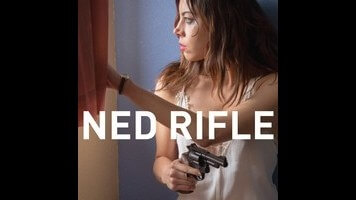The shift of emphasis to Ned Rifle, Fay and Henry’s son, calls to mind a different Linklater movie, Boyhood, as Liam Aiken has been playing the character since he was 7 years old. (He’s now 25.) After Fay was arrested on terrorism charges—it’s hard to overemphasize how goofy that sounds if you’ve only seen Henry Fool—Ned was placed in witness protection, and has spent the last several years living with a devout Christian family. Now emancipated, he’s intent on killing Henry, who he blames for ruining his life (due to events from Fay Grim that aren’t worth rehashing here). Just as he’s making preparations, however, he’s accosted by a scarily intense grad student named Susan (Aubrey Plaza), who’s written her dissertation on Simon Grim and desperately wants Ned to introduce her to his uncle. Eventually, Ned and Susan both travel to Seattle in search of Henry, though the meeting doesn’t go as planned for either party.
Fay Grim mined most of its comedy from the sheer ridiculousness of placing Henry Fool’s characters in a Robert Ludlum scenario, played with a straight face. Ned Rifle, by contrast, functions more like a series of callbacks aimed at Hartley’s loyal fan base, even though Ned was barely glimpsed in the previous films and Susan is entirely new. (Aiken doesn’t make much of an impression, but Plaza speaks Hartley’s deadpan dialogue as if born to it.) Hartley alumni like Robert John Burke, Martin Donovan, Bill Sage, and Karen Sillas make appearances, and even the film’s title is a jokey reference to the pseudonym Hartley has long used when composing his scores.
Consequently, anyone coming to Ned Rifle cold will be bewildered. But there are numerous pleasures for the initiated, from Ryan’s continuing dissolute mellifluence as Henry Fool to Simon’s rebirth as a terrible stand-up comic constantly monitoring the comments on his blog. Given Hartley’s gradual fade from indie prominence since the ’90s, it’s tempting to read Simon as his director’s bitterly rueful stand-in. “People want a good laugh now and then,” he tells Ned. “Good old-fashioned slapstick humor, naughty innuendo, a few well-placed fart jokes. Enough with the earnest reflection—the tragic but unifying elusiveness of the human spirit in modern times, and so on. I’m through with it.” Spoken like a man who no longer knows where he belongs, and has fallen back on amusing riffs.


 Keep scrolling for more great stories from A.V. Club.
Keep scrolling for more great stories from A.V. Club.